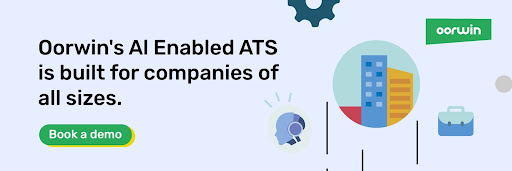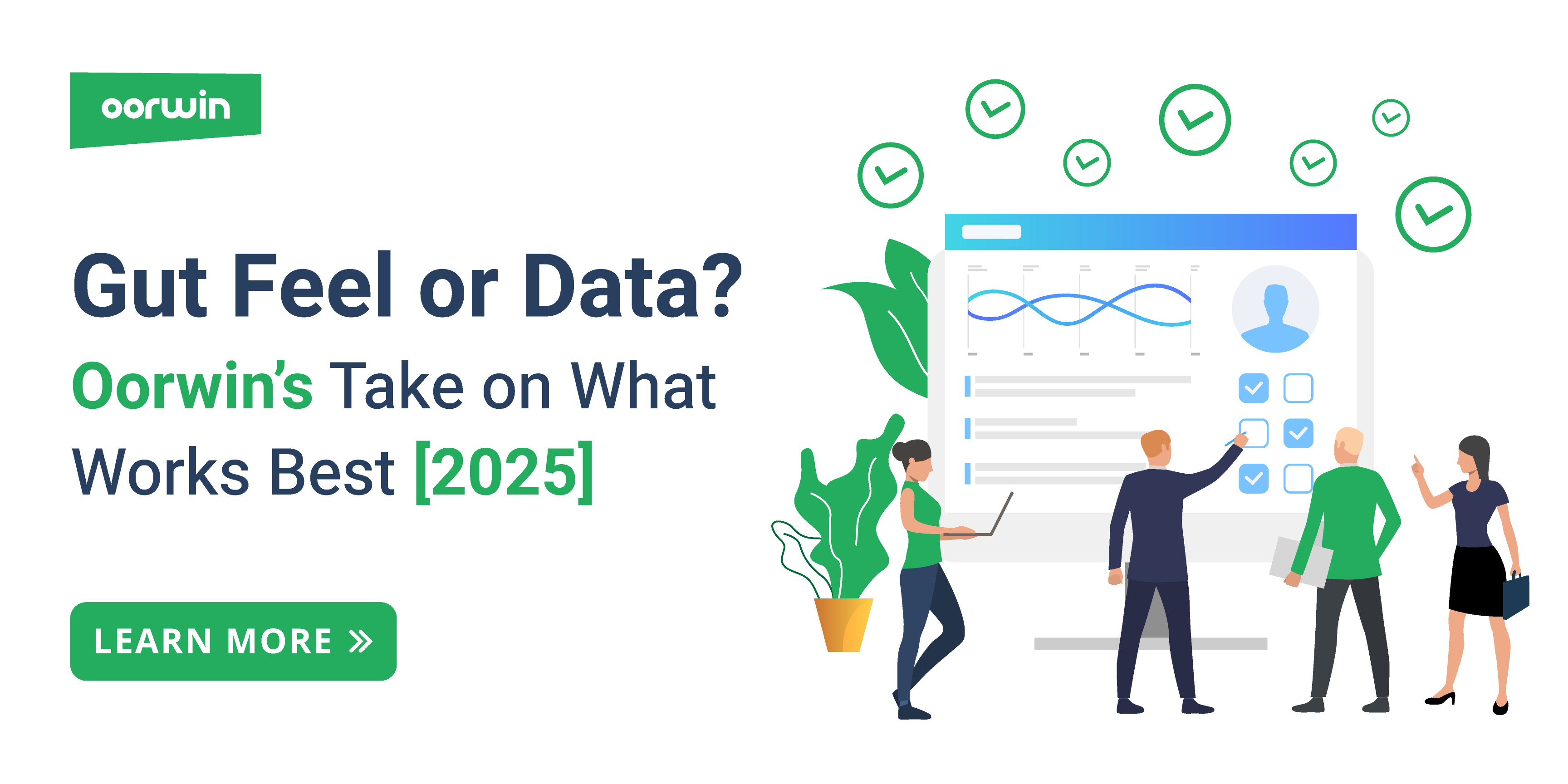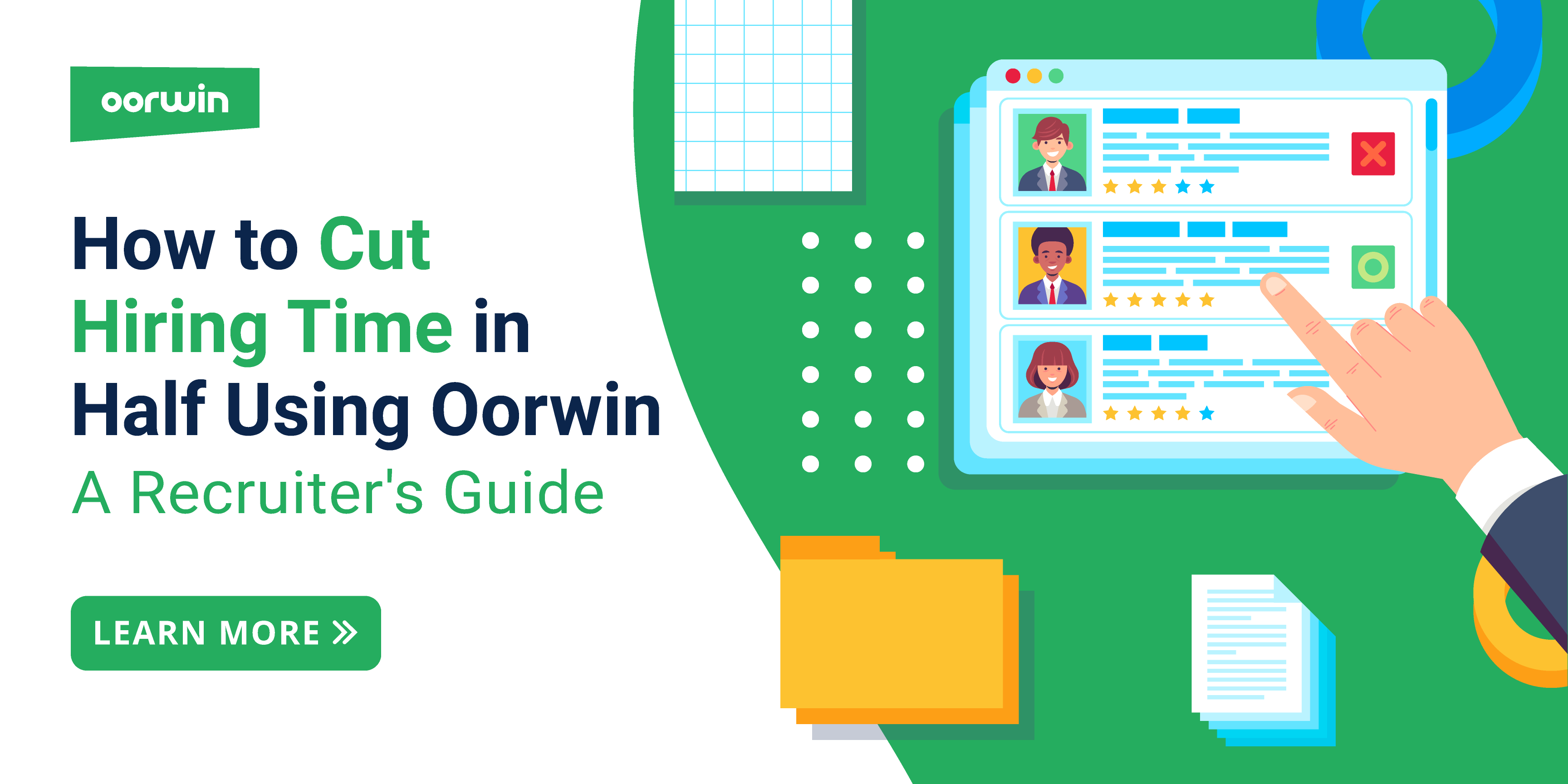Discover the Power of Talent Assessment Tools in Your Recruiting Model
Oorwin
9min read / 30 Nov 2022

Related Articles
Maximize Your Recruiting Strategy with the Best Talent Assessment Tools
People are the biggest asset of any company. Attracting and retaining the right talent is crucial for the growth of any business. To enhance the impact of your talent assessment strategy, consider incorporating talent assessment tools for talent management efficiently.
In today’s dynamic and competitive business landscape, utilizing an effective talent assessment tool is crucial for identifying, nurturing, and retaining the best talent. This hinges on using cutting-edge talent assessment tools that provide in-depth insights into candidates’ abilities, potential, and organizational fit. In this blog, we delve into the world of talent assessment tools, exploring their significance in shaping a robust talent assessment strategy. We will discuss the latest advancements in these tools and what the talent assessment tools in the market are. By integrating these innovative solutions, businesses can make informed decisions, enhance workforce productivity, and ultimately drive organizational success.
What are Talent Assessment Tools?
Talent assessment tools are specialized instruments organizations use to evaluate and identify the skills, abilities, and potential of current and prospective employees. These tools encompass various methodologies, including psychometric tests, cognitive ability assessments, personality questionnaires, skills tests, and situational judgment tests.
They provide valuable data to make informed decisions about hiring, promotions, and team development. By objectively measuring various attributes such as intelligence, emotional intelligence, job-specific skills, and behavioral traits, talent assessment tools help predict a candidate’s performance and cultural fit within an organization. This leads to more effective recruitment, enhanced employee development, and improved organizational performance.
How to Effectively Use Talent Assessment Tools in Recruitment
Talent assessment tools have various built-in assessments to help evaluate a candidate’s knowledge, skills, abilities, and potential. Here’s how to effectively make use of these tools in your recruitment process:
- Establish the Criteria: The initial step is clearly defining what skills and qualifications are necessary for the role. For example, if the job requires advanced coding abilities, specify which programming languages and technical skills are essential.
- Choose the Right Assessments: Based on the established criteria, select appropriate tests from the tool’s extensive library. Most talent assessment platforms provide a variety of tests for different areas. You can also utilize customizable options to combine various assessments (like psychometric, behavioral, and technical) and include role-specific questions.
- Distribute the Assessments: The next step is sending the assessment links to the candidates via email or other communication methods. This ensures that candidates can easily access and complete the assessments at their convenience.
- Analyze the Results: After candidates complete the assessments, the software automatically processes the results, grades them, and produces detailed reports on each candidate’s performance. This data is crucial in making informed hiring decisions and identifying the most suitable candidates.
How to Select the Ideal Talent Assessment Tools
Incorporating pre-employment assessments into your recruitment process can be significantly enhanced by choosing the right talent assessment tool. To ensure you select the best tool that aligns with your recruitment needs, consider the following steps:
1. Conduct Thorough Research on Providers: With the abundance of talent assessment tools available, it’s crucial to research and compare various options. Look for tools offering features like customizable assessments, reasonable pricing structures, extensive libraries of diverse questionnaires, and multi-language support.Administer Relevant and Concise Tests: Tailor your assessments to the specific requirements of the job role. For instance, personality tests for managerial roles and coding tests for technical positions. Keep the assessments brief to prevent candidate fatigue and dropout; studies indicate a higher completion rate for tests under 40 minutes.
2. Ensure Mobile Compatibility: As a significant portion of job seekers use smartphones for job-related activities, opt for a tool that provides mobile-friendly assessments with an intuitive interface, quick loading times, and consistent performance across various devices.
3. Integrate with Your Applicant Tracking System (ATS): Opt for a tool that seamlessly integrates with your ATS, enabling smooth data transfer and reducing the need for manual data handling. This integration streamlines your recruitment workflow and enhances overall efficiency.
4. Utilize Results for In-Depth Analysis: Use the outcomes of these assessments to gain insights into candidates’ strengths and weaknesses. This information should guide your interview questions, helping you to explore candidates’ capabilities more thoroughly and identify the most suitable fit for the role.
Additional Tips For a Better Talent Assessment Strategy
When assessing talent, it becomes important to gauge when the prospects have the passion for the industry to plan to work in. Talent assessment strategies are essential for evaluating a candidate’s fit for a role. Let’s look at some popular talent assessment methods used in talent assessment strategy.
- Work Samples: Candidates complete tasks similar to those they’ll face on the job, providing tangible evidence of their capabilities.
- Cognitive Ability Testing: Assesses numerical, verbal, logical reasoning, and problem-solving skills, indicating general intelligence and comprehension abilities.
- Structured Interviews: Employers ask standardized questions, allowing for consistent evaluation of skills, experience, and communication abilities.
- Work Trials: Candidates work for a short period at an agreed rate, testing compatibility and performance in real job conditions.
- Group Activities and Games: Used in group interviews to observe teamwork, problem-solving, and interpersonal skills in a collaborative setting.
- Problem-Solving Assessments: Evaluate a candidate’s analytical abilities and suitability for critical thinking and leadership roles.
- Personality Assessments: Analyze behavioral patterns and traits such as leadership and reliability, supplementing other evaluation methods.
- Talent Assessment Tools: Utilize various tools like aptitude tests and skill assessments for objective evaluation, enhancing recruitment efficiency, reducing bias, and improving talent pool quality.
8 Best Talent Assessment Tools in 2024
In the ever-evolving landscape of talent assessment, organizations are constantly seeking tools and solutions to identify and nurture the right talent. Here are the best five talent assessment tools that are making waves in 2024:
1. Maki
G2 RATING: 4.9/5
Maki, a flexible talent assessment software, empowers recruiters with the capability to create and customize psychometric assessments. The software provides over 20 ATS integrations and enables candidate invitations through various methods, including emails, links, and even innovative free QR codes. One of Maki’s key features is its advanced automation, which streamlines the review of candidate assessments and facilitates sending personalized feedback.
The platform significantly reduces screening time and efforts and supports bias-free decision-making by anonymizing candidate profiles. Pricing details are available upon request, and a free trial is offered to prospective users.
2. Hirevue
G2 rating: 4.1/5
HireVue, leveraging a blend of AI, Organizational Psychology, and Data Science, designs assessments that pinpoint key competencies required for various roles. This talent assessment tool crafts game-based, psychometric pre-hire tests that effectively gauge a candidate’s cultural fit within an organization. Key advantages of HireVue include its user-friendly and intuitive user interface and user experience. The tool efficiently screens many applicants relatively quickly and features auto-scored coding assessments for ease and speed. Pricing information for HireVue is available upon request, although a free trial is not currently offered.
3. Testlify
G2 rating: 4.8/5
Testlify is an advanced talent assessment software designed for evaluating candidates’ potential and communication skills in the pre-hiring stage. Created by subject matter experts, it ensures fairness and objectivity in recruitment, promoting bias-free decision-making. A notable feature of Testlify is its automation in inviting candidates, grading their performance, and generating prompt reports. Additionally, it offers recruiters the flexibility to tailor tests to their specific requirements. The software offers a 7-day free trial, and its monthly pricing plans start at $19.
Oorwin’s integration with Testlify combines Oorwin’s comprehensive talent management capabilities with Testlify’s advanced candidate assessment features.
4. HackerEarth
G2 rating: 4.1/5
HackerEarth specializes in recruiting, evaluating, and upskilling developers. The platform empowers recruiters to make well-informed decisions, screen developers efficiently, and match them to suitable roles, enhancing hiring and continuous learning. It boasts an extensive library of over 16,000 questions for more than 18 roles and 900 skills, covering 40+ roles and 10+ frameworks. HackerEarth stands out for its automated candidate evaluation, benchmarking, and seamless integration with major Applicant Tracking Systems (ATS). Additionally, it’s a prominent host of online hackathons and coding challenges, engaging a community of over 7 million developers.
The integration between Oorwin and HackerEarth creates a powerful synergy for talent acquisition and skill assessment.
5. iMocha
G2 rating: 4.4/5
iMocha excels in evaluating candidates’ talents, personalities, and communication skills, particularly in business contexts. The AI assessment tool within iMocha is adept at analyzing reading, writing, and speaking abilities in a single test, utilizing sentiment analysis, contextual comprehension, and business language domains. Key advantages of this tool include providing actionable insights into vocabulary, readability, and oral fluency. Additionally, it incorporates advanced image and video proctoring features to enhance the integrity of the assessment process. iMocha offers comprehensive talent assessment software with a free trial and paid plans starting at $5000 per year.
6. TestGorilla
G2 rating: 4.5/5
TestGorilla features a comprehensive library of over 315 scientifically validated tests, enabling a wide range of skill assessments for job applicants. The platform is known for its user-friendly interface, allowing recruiters to create and distribute assessments in just about 10 minutes. TestGorilla also delivers detailed reports on candidates’ overall performance and personality traits. To maintain the integrity of the testing process, it has implemented several anti-cheating measures, such as disabling copy-paste functions and monitoring candidates’ activity during the test. TestGorilla provides an intuitive talent assessment solution with a free unlimited plan and paid options starting at $26 monthly.
7. Vervoe
G2 rating: 4.6/5
Vervoe specializes in skill-specific assessments to evaluate communication skills using AI-powered tools. This platform aims to create a bias-free recruitment process, particularly effective in entry-level testing. It not only improves the diversity of the talent pool but also enables recruiters to compare candidates’ scores against others, enhancing the decision-making process. Notably, Vervoe is acclaimed for its efficiency in bulk recruitment and an easy-to-use interface, making it a valuable tool for modern hiring needs. It has paid plans starting at $228 per year and a free trial available,
8. Harver
G2 rating: 4.6/5
Harver is a comprehensive cognitive ability assessment platform that creates extensive tests encompassing various cognitive skills. Its customization options stand out, allowing recruiters to tailor modular subtests to focus on the most pertinent abilities for specific roles. The platform’s assessments are validated by 31 I-O psychologists, ensuring reduced bias and effective talent identification. Key features include the automation of repetitive tasks and the automatic grading of assessments, with results presented in easy-to-understand visual formats. Pricing for Harver’s services is available upon request.
The Importance of Talent Assessment Tools
In today’s competitive job market, finding the most effective way to evaluate the skills of potential candidates is essential for every industry. When selecting candidates for a position, it’s crucial to consider more than just their skills. Aspects such as communication skills, general aptitude, cognitive abilities, and behavior are key in assessing a candidate’s fit for a role. Talent assessment tools are instrumental in providing a detailed evaluation of these attributes.
Typically, these tools utilize data and analytics from various sources to pinpoint the essential performance indicators for successful candidates. By harnessing these insights, recruiters can make informed, unbiased hiring decisions.
Furthermore, candidate assessment tools enhance the efficiency of the evaluation process. They automatically score tests and produce reports, significantly reducing the time and effort to accelerate recruitment.
Investing in the best talent assessment tools can help you make informed hiring decisions, reduce time and costs, and improve your talent pool’s overall quality. Don’t miss the opportunity to maximize your organization’s potential – consider incorporating a comprehensive talent assessment tool today with Oorwin.
Frequently Asked Questions
What are talent assessment tools, and why are they important?
Talent assessment tools are specialized instruments used to evaluate candidates’ skills, abilities, and potential, helping to make informed, unbiased hiring decisions and improving the recruitment process’s efficiency.
How can talent assessment tools be effectively used in recruitment?
To use talent assessment tools effectively, establish clear criteria for the role, choose relevant assessments, distribute them to candidates, and analyze the results to make informed hiring decisions.
What factors should be considered when selecting talent assessment tools?
When selecting talent assessment tools, consider factors like the tool’s ability to offer customizable assessments, its integration with existing systems, the user experience, and its ability to provide in-depth candidate analysis.
Popular Articles..
Blog

6min read / 25-Jun-2025
Master Effective Interview Techniques with Oorwin: A Step-by-Step Recruiter’s Guide
Blog
Blog
Get the latest Oorwin releases, updates, success stories & industry news
 Back
Back


